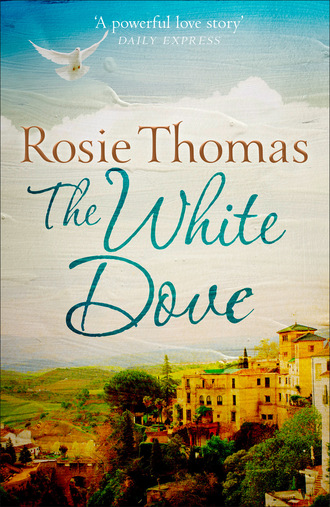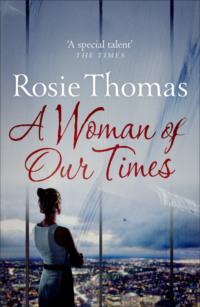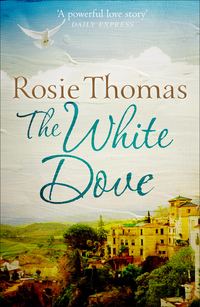
Полная версия
The White Dove
The Welfare was the heart of Nantlas now that the congregation could no longer afford a minister for the chapel. It was funded by the Federation, and people came to it for company, for books and classes, support and sympathy, and for the occasional celebration like Nannon Jones’s wedding that still managed to happen, somehow. The long, dingy green-painted hall was hung from side to side with paper streamers, salvaged from Christmas decoration boxes and forgotten Gala days. On the stage at the far end were the music stands and instrument cases of the choir and silver band, waiting for the climax of the evening when the singing would start. Beneath the stage on a trestle table covered with a white cloth, the wedding cake was given pride of place. Nannon Jones had baked it herself, and put hours of work into the carefully piped white icing. Down the length of the hall were more trestles decorated with red and green crepe paper, laden with neat plates of sandwiches, pies and cakes. The Welfare tea urns stood ready, and there were barrels of beer as well, and even bottles of sherry bought with the money Bethan had sent.
The bride and groom stood at the hall door with their parents, welcoming the guests. Gwyn Jones was almost forty, shortsighted and weak-chested, but he was a popular manager of the Co-op. You could always get a bit of help from Gwyn when you were short, the Nantlas women said. Local opinion approved of the match, even though Nannon Jones was hardly into her twenties.
‘Well done, well done,’ the older guests murmured to each set of parents as they shuffled past. ‘And a fine spread, too. Well done to you.’
There was much admiration of the feast set out on the tables. Everyone understood the scheming and saving that must have gone into providing it, and appreciated the generosity of offering it to share. There were no whispers about trying to go one better, or making a show. Hardship had drawn the valley communities closer together.
Myfanwy Jones, the village midwife, stood at the door beside her husband. She was beaming with happiness. At least her youngest had found a good, solid man who would look after her and not ask her to live with the fear that he would walk out of the door one morning in his pit clothes and with his snap-box under his arm and never come back.
She greeted the Penrys with extra warmth as they came in. She never forgot any of the babies she delivered, but she was not likely to forget the night of Dickon’s birth.
There had been nothing unusual to start with. Mari’s pains had been coming steadily all evening and into the night, and Myfanwy had been reassuring her that the baby would be born soon. Then she had bent over to listen to the baby’s heartbeat, and it had gone. Mari’s face was suddenly grey against the pillows. The midwife ran to the top of the stairs and shouted to Nick, sitting by the kitchen range. ‘Run! Run up for Dr Owen, ask him if he’ll come down. She needs forceps.’ There had been a flutter from the baby’s heart as she listened again, faint and irregular, and then nothing.
The minutes dragged past.
Into the silence came the stumbling crash of Nick running back up the stairs. ‘He can’t come. His wife says he’s gone up to one of the children at the Lodge. Oh God, look at her. Save her. I don’t care about the baby, if you can save Mari.’
‘I’ll save them both,’ Myfanwy Jones said grimly. It wasn’t the first time that Dr Owen had been unable to come to a house that was unlikely to be able to provide him with his fee. ‘You’ll have to help me. Hold her, will you?’
Myfanwy knew what to do, although only doctors were supposed to practise it. She even had the right instruments ready in her bag, but only when there was no other alternative could she resort to her own skills.
She took the things out, not looking at Nick Penry’s dead white face. ‘Hold her properly,’ she ordered him harshly.
When Dickon was dragged out into the world his face and hands and feet were blue, and he was completely still.
‘She’ll do,’ Myfanwy said after a brief glance at Mari, and she bent over the huddled baby. She cleared the tiny air passages, and then tried everything she knew to make him breathe.
‘Come on, my darling,’ she whispered to him like a lover. ‘Breathe for me.’
At last, after eternities of time, there was a tiny, thin wail. Mari’s eyes opened and fixed on the baby. The blueness began to ebb from Dickon’s face and Myfanwy breathed again herself. Only when Mari was comfortable and the baby was wrapped up in his father’s arms did she say as gently as she could, ‘I think he will be all right for now. But I can’t say for … later. He went a long time without breathing. Do you understand?’
Mari was too weak to take anything in, and she didn’t know whether Nick had even heard her. He sat quite still, with the baby hugged to his chest, staring right through her, right through the wall and out into the street.
Six years ago, that was, Myfanwy remembered. The year after the explosion in No. 1 Pit.
‘Hello, my lamb,’ she said now to Dickon. ‘There’s the big boy.’
The child stared back at her. It was impossible to tell how much he understood.
‘Is he talking much yet?’ she asked Mari.
‘In his way.’ Mari smiled calmly. Nick had already walked past, down to the end of the room where the men were standing in a group at the foot of the stage steps. ‘I will. Thank you,’ she said. Someone was holding a plate out to her. She wasn’t exactly ravenous, they had eaten something before coming out just so that they wouldn’t look too hungry, but paste sandwiches, and cake, were almost forgotten luxuries. Mari took a sandwich and broke it carefully in half for Dickon.
When the food was all gone, and the room was full of a warm, satisfied buzz, Nannon’s father pushed through the crowd and went up on to the stage. The bride, pink-faced, with her husband beside her, stood just below. William Jones held his arms up.
‘Friends. Neighbours and friends. I’m not going to ask you to stop in your enjoyment for too long. Just to join with me in drinking the health of Nannon and Gwyn, and wishing them everything for the future. And in remembering the friends who can’t be with us tonight. My eldest daughter, Bethan. And my boy David, in London too, looking for work. Two boys from the other side of our new family as well, Gareth and Glyn, trying their luck in the Midlands. May they be lucky, and may we start to have some luck here too. Here’s to some better times for all of us. Cheers, now.’
He raised his pint glass, his red face glowing, and tipped his head back to it. There was an uproar of cheering and clapping and stamping on the wooden floorboards before he held up his hand again.
‘Oh yes. One last thing. We’ve got a new big man with us tonight.’
Faces were turning in the crowd, and heads craning. Mari realized with a sudden sinking fear that they were looking at Nick.
‘We’ve just heard now, elected Secretary of the Rhondda Branch of the SWMF. Nick Penry, a good Nantlas boy if ever there was one. Give him a clap now, for all his hard work in the past, and to come.’
Mari listened to the clapping, frozen.
It was an important post, although an honorary one. It meant that Nick would be working at a level in the Federation that represented all the pit lodges in the Rhondda valleys. Beyond that it would give him a voice at the top level, on the main South Wales executive. Mari knew that it was the beginning of real power for him, the beginning of real influence, in the world that he cared about. Nick was a Communist because its importance confronted him every day of his life.
And yet, he had never even mentioned to her the possibility of his election. Had they already drifted so far apart that he was sure of her disapproval, certain that she would not put her support behind him?
Mari was proud of him still, but she had lost the ability to tell him so. Just as Nick in his turn seemed to have lost the ability to sympathize with her fears and anxieties.
Mari bit her lips and looked across the room at him.
‘Speech! Speech!’ Nick was being pushed up on to the stage. She watched him, thinking how much at ease he looked on the platform. He wasn’t red-faced and awkward like William Jones, nor was he over-confident and strident. He was just Nick himself, and he smiled down at them as though they were all old and well-loved friends.
‘I don’t want to make a speech …’
‘Shame! Shame!’
‘Let the man speak, will you?’
‘… and neither do you want to hear one. I just want to say thank you for voting me into a position where I might be able to join in helping us, and the industry, back up off our knees.’
‘That’s it, Nick boy. You tell ‘em.’
‘I’m glad that Nannon and Gwyn Jones have given us something to celebrate together, tonight. This is all we’ve got left now, isn’t it? Staying together, all of us, whether it’s this village, or the Rhondda, or South Wales, or the whole community of miners all over the country. And what’s more …’
The room was quiet now. Everyone was watching Nick.
‘… that’s the only thing that really matters. So long as we’re together, so long as every one of us in this room, and in every pit and Welfare Hall across the country, believes that miners and not millionaires should run our pits, well then, we can win. Then our children can go to school in boots again, and our wives can go out to buy food for our families.’
There was a moment of complete silence before the clapping and cheering broke out again.
Oh yes, Nick, you believe it, Mari thought. It’s all you care about, except perhaps for Dickon. And standing up there, somehow you can make everyone else believe whatever you want. You’ve got a talent, sure enough. And you’re not the kind of man to waste a talent, are you?
The room was full of the warmth of friendliness. Mari lifted her head, watching her husband.
‘There you are,’ he said. ‘I told you I wasn’t going to make a speech. Let’s get on now and dance and sing, and forget everything for a few hours. We’re here to celebrate a wedding, aren’t we? I hope you’ll be very happy, Nannon and Gwyn. I hope you’ll be as happy as Mari and I have been.’
Nick had ducked down from the stage and was pushing his way through the crowd. She saw his head, taller than the others, looking around for her. In Mari’s arms Dickon said ‘Da’ in a pleased voice and held out his arms to him. When Nick reached her side Mari said, without looking at him,
‘Why didn’t you tell me?’
‘Would you have wanted to know?’ As he always did, Nick met a challenge with a challenge.
‘Husbands and wives usually mention these things to each other. You make me feel like a stranger, Nick. And why wish that on Nannon and Gwyn? I wouldn’t want anyone else to have to enjoy our kind of happiness.’
‘You still make me happy, Mari,’ he said softly. He put his arms around her and Dickon, and forced her to look up so that he could see her face. ‘I’m sorry if I can’t do the same for you. I’m still the man you married, you know. Just the same.’
Regardless of the crowd around them he kissed her, warm against her cold cheek. ‘I could prove it to you, if you’d only let me. Come on, dance with me. At least then I can hold you close and still look decent.’
‘What about Dickon?’
‘Give him to your mam to hold, for God’s sake. Just this once.’
The band was assembled on the stage, and after the tootlings as they tuned up they swept into a waltz. Couples stepped out on to the creaky floor. Amongst the replete pink faces and careful best clothes there was an atmosphere of revelry almost forgotten in Nantlas.
‘Why do you blame me,’ Nick whispered, ‘for trying to make it possible for nights like this to happen every week?’
‘I don’t blame you, my love.’
Mari carried Dickon over to her mother. The child allowed himself to be handed over uncomplainingly, but he never took his eyes off his parents.
‘That’s better,’ Nick said. ‘And now, may I have the pleasure?’ He looked proud, and happier than she had seen him for a long, long time.
Mari saw his arms held out to her, and she smiled. Her eyes met Nick’s and she caught his happiness. Suddenly, surprisingly, she felt like a young girl again. Their quarrel was all forgotten. The music lifted her spirits higher and she stood for a second swaying in time to it. Then Nick’s arms came around her and they were off across the splintery wooden floor.
Mari tilted her head back so that she could look at him. Nick saw a flush of colour in her cheeks, and a light in her face that turned her back into the pretty, merry Mari he had married. He held her tighter and they spun in the dance together.
‘Nick?’ she whispered.
‘Yes, my love?’
‘I’m still the woman I was, you know. And I’m … glad you’re doing the work you are.’
Nick stopped dancing. His head bent quickly over hers and he kissed her. And all around them the waltzing couples smiled and nodded to each other.
When Mari’s eyes opened again they were sparkling. For a moment the world felt a warm and festive place.
‘Come on, Nick Penry,’ she ordered him. ‘Let’s dance.’
They moved again, holding each other close. Nick was humming to the music. With her head against his shoulder Mari could hear the sound of it, deep in his chest.
It had been a beautiful wedding. There was no need to cry, Amy told herself. Adeline hadn’t cried at all, and the bride’s mother was almost expected to do that. Amy thought of her mother at the front of the packed, flower-massed church, her skin like white silk against the black velvet Cossack coat and her hair flaming red under the shako hat. No, Adeline wouldn’t have cried. Not in front of the Royal Family, and Lady Colefax, and Mr Baldwin. It had been a great day for Adeline and she had orchestrated it perfectly. Nothing as spontaneous as tears would have been allowed to spoil it.
Amy wrung her facecloth out in cold water and pressed it against her eyes. Just five minutes up here in her room, just five minutes to collect herself, and then she would go downstairs again.
The new Mr and Mrs Jaspert had driven away at last, only a few minutes ago, but the party had barely faltered. Adeline’s parties were famous, and the departure of the principals was going to make no difference to this one. Or two, rather, Amy decided. In the huge, long room on the first floor the grandees were dancing stiffly under the chandeliers. There was a buffet supper in the dining room, where the pink claws and ridged shell backs of lobsters stood ferocious guard around the silver bowls filled with black beads of caviar. In the library the tables were set out for cards. But in Adeline’s white drawing room and further up the house, there were noisier, smarter people. Amy had glimpsed a woman in a man’s evening suit, with her hair cropped and brushed flat to her head, and another with her arms loaded from wrist to shoulder with ebony and ivory carved bangles. This party, where the sharp babble of conversation rose to the same crescendos as the jazz, was the one Amy wanted to join. She had been slipping into it, listening to the talk and searching for someone she knew well enough to attach herself to, when Bethan came to whisper to her that Isabel and Peter were leaving. They had gone down to the hall together.
Isabel was standing in a blaze of light while Peter shook the hand of everyone in sight. Her going-away suit was the colour of honey, the ankle-length skirt and slim jacket making her look taller. A cloud of fur framed her face, and a single jaunty feather stuck straight up from the top of her little tilted hat.
‘She looks lovelier than I’ve ever seen her,’ Bethan murmured.
The sisters kissed each other.
‘I’ll be back soon,’ Isabel promised. Amy gripped her arms. Perhaps she was imagining it, but she thought that under the soft stuff of her suit Isabel was trembling.
Lord and Lady Lovell, perfectly correct, were saying goodbye now. Peter Jaspert shook their hands firmly, and kissed Adeline on both cheeks. Then the front doors were open and a gust of cold air swept around them. Peter put his arm around his wife’s shoulders and hurried her out to the car waiting at the foot of the steps. There was a flurry of waving and shouting and then the car roared away. They were gone, and not even Isabel had any idea where Peter was taking her. Glass, his normally impassive face creased by the faintest of smiles, was shutting the doors again. Amy felt a moment of pure, panicky loneliness. She turned round to see that her mother was already on her way up the great curving staircase. Her black dress left her back completely bare, with an impertinent flat bow at the bottom of the deep V. Gerald Lovell, without a backward glance, was on his way to join the card-players in the library. From now on, the party was Adeline’s business.
Amy had run up through the crowded house to her bedroom. The day had gone so quickly, she needed a moment to straighten it out in her head, and to fight back the threatening tears. Even in the silence of her room, she could only see a series of images flashing in front of her eyes. Isabel drifting down the aisle on Gerald’s arm, a column of pure white silk and lace, with points of blue light flashing from the diamonds in the Lovell tiara. Peter at the altar, turning back the lace veil to touch his lips to Isabel’s. Eight tiny bridesmaids and pages in white satin, all blinking at the press photographers clicking at them. Gerald and Adeline, standing stiffly at the head of the stairs to receive the guests, and Richard’s studiedly impassive face winking at her over his starched collar. Isabel’s small hands closed over Peter’s as they pressed the silver knife into the crenellated cake. And Bethan, sobbing quietly in the corner of Isabel’s empty room after the last leather trunk had been carried away. Bethan had cried, on the day when her own sister was being married far away without her.
Amy screwed the facecloth up into a ball and flung it away from her. She faced the mirror and addressed herself squarely.
‘Pull yourself together. Isabel’s married. Of course Isabel was going to marry. Would you have wanted to stop her? What you should do, Amy Lovell, is go downstairs and drink some champagne. Look for someone to dance with. And tomorrow, find something positive to do instead of feeling so sorry for yourself. Is that quite understood?’
The face that looked back at her was still watery-eyed and pink around the nose, but it was less obviously woebegone. Amy shook her head briskly, and her gleaming hair swung in exotic, unfashionable waves around her face. She picked a brush up from the dressing table and whisked some colour on to her cheeks. ‘Much, much better. Someone might actually ask you to dance now.’ As she stood up, Amy thought she caught the faintest drift of Isabel’s flowery perfume. She took up her own crystal bottle and squirted it determinedly around her. Then she shook out the folds of her dress, thinking approvingly that the pale lavender colour actually suited her, and marched to the door.
The white drawing room was packed to the walls.
Amy edged her way slowly into it, listening to the snippets of talk that floated out to her.
‘Ninety per cent pure shit, darling, but ten per cent genius.’
‘A tonal symphony. Poetic asymmetry.’
‘And so we went for a Friday-to-Monday, but there was not a soul there …’
‘Hello.’ Someone pushed out of the crowd and stood squarely in front of her. Amy looked up to see Tony Hardy. He still appeared to have inherited his evening clothes from a misshapen relative.
‘Don’t you remember me?’
‘Tony? Of course I do. Isabel always said I should call you Mr Hardy, not Tony.’
Tony smiled at her. ‘I remember. Should I call you Miss Lovell, now?’
‘Definitely not.’
‘So, Amy, are you looking for someone in particular?’
‘Just someone to talk to. I know quite a lot of these people by sight, and a few of them well enough to say how d’you do, but no one at all to attach myself to and ask why I feel like an ostrich in my own home at my own sister’s wedding. Except for you, that is. Oh, I could go downstairs and dance with Johnny Guild or somebody, and then go out on the balcony and do some damp embracing. But if I stay up here I thought I might be able to step across to where debutantes don’t tread. Like Richard did, last night.’
Amy was conscious that she wasn’t sounding quite rational. It must be the champagne. Another of the day’s images drifted into her head, of the Duchess of York in the church, floating blue feathers framing her face.
Tony was looking at her levelly. ‘You don’t look anything like an ostrich. You look … extremely beautiful. I always thought you would be more beautiful than Isabel, once you grew into yourself.’
Amy stared back at him. He had very light hazel eyes, and eyebrows that went up in peaks. She felt a faint flush of colour rising in her face.
‘Let’s find somewhere to sit down,’ he said. ‘Debutantes never tread anywhere near me, will that do? And I think I can promise that I won’t embrace you, damply or otherwise.’
As she followed him, Amy wondered why that seemed to amuse him.
They found a sofa in an alcove. A tall fern in a white marble urn dipped in front of them like a screen. Tony put a champagne glass into her hand.
‘Now. What’s the matter?’ he asked her.
Amy considered. It was partly losing Isabel, of course, but only partly. There was something bigger than that, less tangible and so more frightening. Amy had the growing sense that she was adrift, directionless and isolated. She had watched Isabel dancing through her successful Seasons, aware of the options open to her and coolly accepting them. Isabel had chosen, and today was the celebration of her continuing to walk on down the broad, comfortable path laid down for her from the day of her birth. Amy had never felt at ease in the way that Isabel seemed to. When she looked at her own version of the path it was flat and uninviting, yet the country on either side of it seemed hostile, or impenetrable, or obscured. She was both bored and apprehensive, disenchanted and anxious, and the combination was uncomfortable.
‘I … don’t quite know what to do. Or how to talk about it,’ she began.
Tony leaned back and lit a cigarette. ‘Is it a love affair of some kind? Or something awkward like a baby? Surely not?’
Amy laughed in spite of herself, and Tony thought that when her face came alive it was enchanting. Most men, he considered, would find her irresistible.
‘No. No, nothing like that. Much less identifiable. I think I’m frightened of not being able to belong. Not to the kind of life that’s offered to me, or even to the kind of life that Mother has created for herself. I don’t want to find myself a scion of the shires, or a bright hope of the Tory Party like Peter. The men I meet are all the same, and they make me feel the same. Rather chilly, and hollow.’
‘Not very enticing,’ Tony agreed.
‘So if I’m not going to marry …’
‘I wouldn’t assume that immediately, you know. How old are you? Nineteen?’
‘Yes. Old enough to know, I think.’
‘Perhaps. Is it likely that you might prefer women?’
Amy held out her glass to have it refilled. She was laughing so much that the froth spilled over her fingers.
‘Tony, what d’you think I am? If not pregnant, then a lesbian?’
‘I don’t know what you are,’ he said equably. ‘You tell me. I’m just eliminating the worst possibilities.’
‘I don’t think I prefer women. A man kissed me once, years and years ago, and that meant more to me than all the men I’ve met and danced with and half-heartedly allowed to kiss me ever since. He was the waiter, Luis, in the hotel in Biarritz, do you remember?’
‘Did he now? Yes, I remember him. Go on.’
Amy took a deep breath. ‘I want something to do. To believe in, if you like. Something real, and valuable. Richard asked me last night what I do all day, and it amounts to shopping, being fitted for clothes, meeting girlfriends and having lunch, going to parties and staying in people’s houses. Helping Father to entertain when Mother isn’t here. At Chance, riding and playing tennis. Seeing neighbours and people on the estate. It isn’t enough.’









